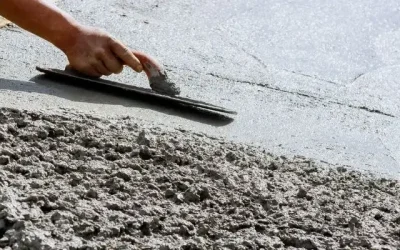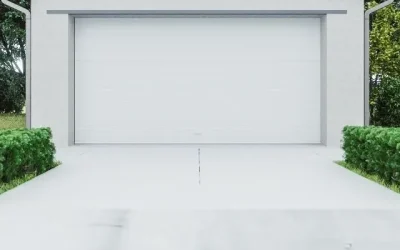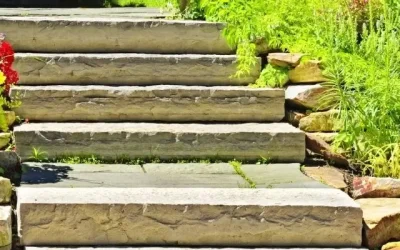Choosing the right material for your outdoor space is a big decision, especially across Brisbane Northside, where you’ll find everything from character Queenslanders in Kedron to modern brick homes in Burpengary and coastal builds in Redcliffe. The area’s mix of clay-rich soils, summer storms, and humid subtropical climate means your deck or patio needs to look good and hold up against the weather. In this guide, we’ll compare decking vs concrete in terms of durability, design, cost, and maintenance to help you choose the best fit for your space, whether you’re planning a brand new alfresco area or upgrading an existing space.
Brisbane’s Climate: Decking vs Concrete in Heat, Humidity, & Storms
Brisbane’s subtropical climate means hot summers, sudden downpours, and long stretches of humidity, all of which can influence how your outdoor surfaces perform and age.
Timber decking is particularly sensitive to moisture. During summer, untreated or poorly maintained timber can swell, warp, or crack. In low-lying suburbs prone to damp conditions like Nudgee, standing water can affect timber performance if drainage around your property isn’t well managed.
Concrete patios handle Brisbane’s climate with greater resilience. They aren’t affected by rain or soil moisture in the same way and perform well even in areas with shifting ground. Concrete is also a smart choice for coastal or flood-prone areas, where consistent moisture or salt exposure can challenge other materials. However, Brisbane’s high summer temperatures can cause concrete surfaces to absorb and retain significant heat, particularly in full sun and north-facing concrete surfaces.
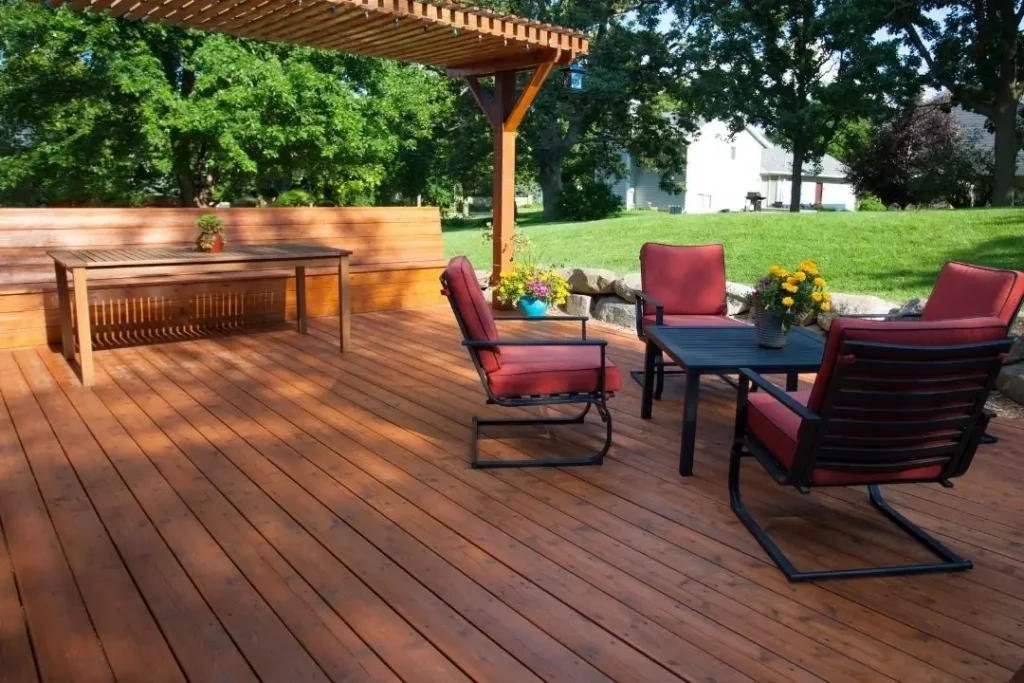
Design Aesthetics: Concrete vs Wood Deck for Brisbane Homes
Brisbane offers a wide variety of home styles from classic Queenslanders to contemporary builds and townhouses. The visual appeal of your outdoor space can really shape how it blends with your home and lifestyle.
Timber decking brings a warm, natural look that pairs well with traditional and elevated homes. It works especially well with the charm of older Queenslanders, adding to the home’s character and offering a seamless flow from indoor to outdoor entertaining areas. Decking also suits leafy spaces, where timber can visually soften the transition from home to backyard. You can choose from hardwood, treated pine, or composite decking, depending on your budget and preference.
By contrast, concrete patios offer a sleek and modern look, which is ideal for newer homes and lower-maintenance landscapes. They suit clean, geometric designs and provide a solid base for outdoor furniture or built-in BBQs, common in homes with open backyard layouts. Design flexibility is another strength of concrete since you can customise its look by choosing finishes like exposed aggregate, coloured concrete, or stamped patterns.
Installation and Cost in Brisbane: Concrete vs Deck
Are concrete slabs or decking cheaper? Cost is often the deciding factor when choosing between decking and concrete. Pricing can vary depending on your block, access, and the finish you’re after.
Concrete patios are usually more affordable upfront. A basic broom-finished slab costs around $90-$130 per m2, while decorative options like coloured or exposed aggregate typically range from $120-$170 per m2. On flat blocks, installation is straightforward, with minimal preparation beyond a level base and good drainage planning.
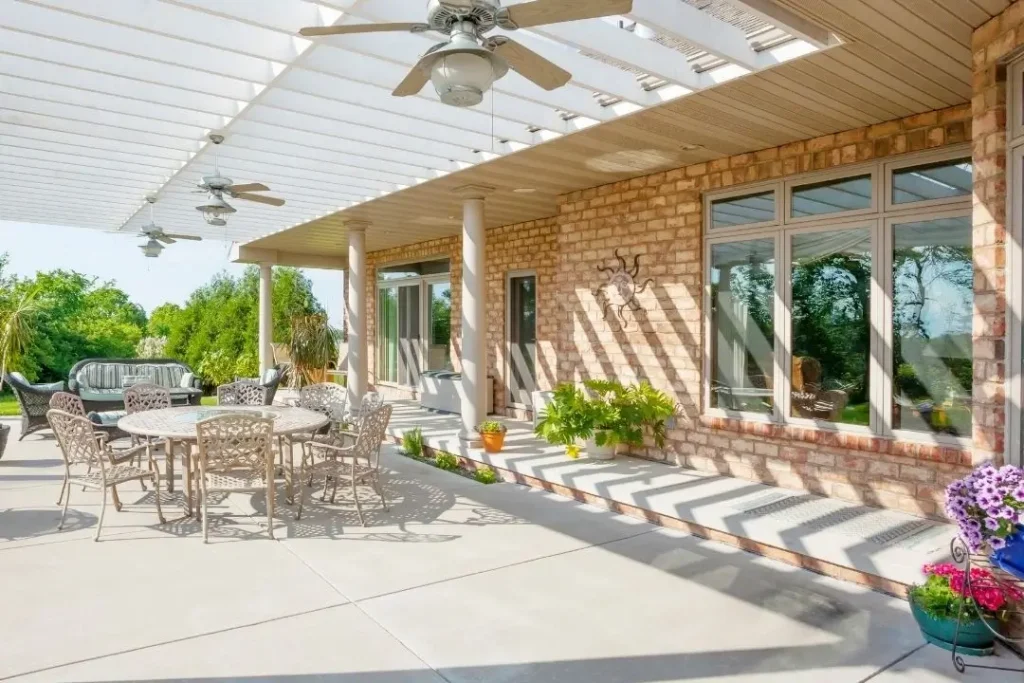
Timber decking comes with a higher price tag. Treated pine starts at around $200-$250 per m2, with hardwood and composite options often reaching $300-$350 per m2. However, decks can be faster and more cost-effective to install on sloping or uneven sites, where concrete would require significant excavation, retaining, or formwork. On reactive clay soils, a raised deck may also reduce groundworks and moisture issues.
So, what is cheaper: a wood deck or concrete patio? On level sites, concrete usually wins out. But for tricky or elevated layouts, decking can offer better value once site preparation costs are factored in.
Maintenance: Concrete vs Decking
Ongoing maintenance is a big part of keeping your outdoor space looking good and performing well, especially in Brisbane, where the humid climate and summer storms can speed up wear and tear.
Concrete patios are far less demanding when it comes to upkeep. A quick pressure clean every so often is usually enough to keep things looking fresh. If you’ve chosen a decorative finish, resealing every few years will help protect it against stains and surface wear. Cracks are rare but can happen over time, especially in reactive clay soils, so it’s worth checking periodically, if you start noticing some cracking then it’s best to deal with it sooner rather than later.
Timber decking needs regular attention to stay in top shape. Fallen leaves and debris can trap moisture and lead to mould, mildew, or rot if the timber isn’t well-sealed. Most decks require oiling or resealing every 12-24 months, plus the occasional check for loose planks, rusted screws, or signs of movement. On shady or damp blocks, airflow underneath the deck becomes important to prevent moisture buildup.
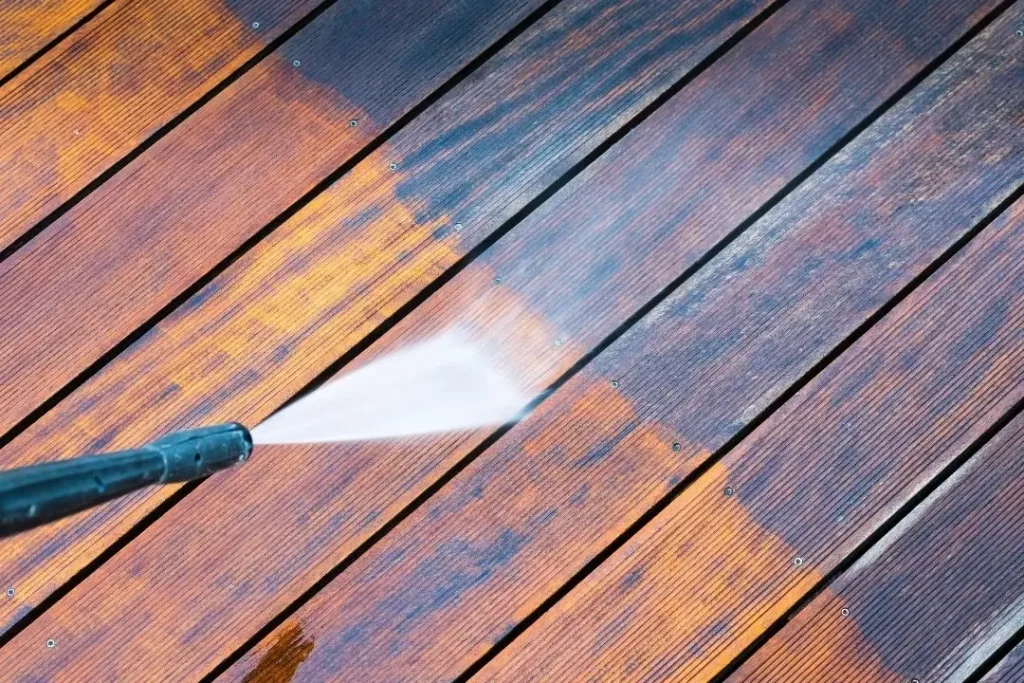
Longevity and Durability: Decking vs Concrete in Brisbane’s Tough Outdoor Conditions
When it comes to long-term durability, both concrete and timber can go the distance, but how well they hold up in Brisbane’s conditions depends on materials, site conditions, and upkeep.
Concrete patios have the edge in lifespan and structural stability. A properly poured and finished slab can last 30 years or more, especially when installed on stable ground and with adequate drainage. In flat and sandy soils, concrete rarely moves or cracks. However, on blocks with reactive clay soils, it’s important that the slab is engineered to handle soil movement. A good Brisbane concreter will know how to prep the base and reinforce the slab to suit your block.
Timber decking generally lasts 10-25 years, depending on the timber species, treatment, and how well it’s maintained. In tree-heavy suburbs where termite activity is more common, using hardwood or H3-treated pine is essential to reduce the risk of pest damage. Moisture exposure can also shorten a deck’s lifespan, particularly on shaded or poorly ventilated sites. Still, with proper maintenance and the right materials, a well-built deck can remain strong and safe for decades.
Comfort and Everyday Use: Decking vs Concrete for Brisbane Backyards
Timber decking is generally more comfortable underfoot in Brisbane’s climate. It stays cooler in the sun compared to concrete and has a slight natural give, which makes it more forgiving for bare feet, pets, and kids. If your backyard has uneven terrain, a raised deck can also provide a smooth, level surface without the need for major earthworks.
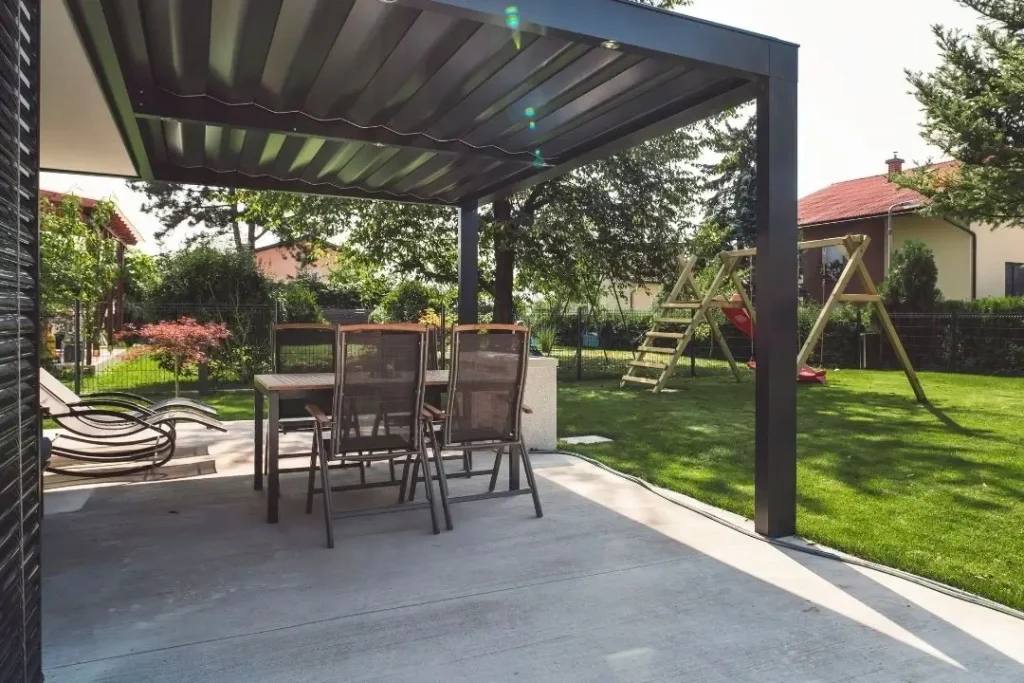
Concrete patios offer more stability and strength, making them ideal for heavy outdoor furniture, BBQs, and high-traffic areas. They’re particularly practical for flat blocks, where you might want a ground-level entertaining space that’s easy to maintain and use year-round. However, during summer heatwaves, plain concrete can get hot underfoot, something to keep in mind if your yard is getting full sun. Adding a pergola, outdoor rug, or choosing a lighter-coloured or textured finish can help reduce surface heat and improve comfort.
From a safety perspective, both materials can become slippery when wet, but this can be managed with non-slip finishes, regular cleaning, and thoughtful design.
Council Approval and Regulations
Before building your new deck or patio, it’s worth checking whether council approval is needed, especially if your property is in a flood-prone zone, on a sloped block, or part of a newer estate with specific covenants.
Most decks generally need council approval. Key factors that trigger council permits are if they’re over 1 metre high, larger than 10sqm, roofed, built close to boundaries, or include features like stairs or balustrades. Council may require engineered drawings and safe balustrade designs. It’s also a good idea to check for any site overlays that may apply, including bushfire zones or character housing protections in older suburbs. For more info, you can check the latest deck approval requirements on the city council’s website, or speak to a local builder who understands Northside regulations and can guide you through the process.

Concrete patios usually fall under exempt development if they’re under a certain size, built at ground level, and don’t affect existing drainage. However, on low-lying or flood-affected lots, you may need a basic drainage plan or flood-resilient design to ensure stormwater flows correctly. In newer estates around Narangba and Morayfield, for instance, it’s also worth checking estate guidelines as some require specific colours or surface finishes when it comes to concreting.
Deck vs Concrete Patio: Which One is Right For You?
Both concrete and decking have their place in Brisbane backyards. The right choice really depends on your budget, block, and how you want to use your space. Concrete suits flat, coastal, or low-maintenance yards and offers excellent long-term durability, while timber decking adds warmth and character, especially for steeply sloping blocks or homes with traditional Queenslander style. Each option has its strengths, so the best choice comes down to what fits your lifestyle and property best.
Decided you want to install a concrete patio? Our team can help you create a modern, long-lasting concrete patio with less maintenance than a deck. We service all Northside suburbs. So if you need a concreter in Redcliffe or a concreter in Windsor, we’re the team for you. Get in touch for a free onsite measure and quote! If you’re also weighing up pavers as an alternative, take a look at our guide on concrete vs pavers to see how they compare.


